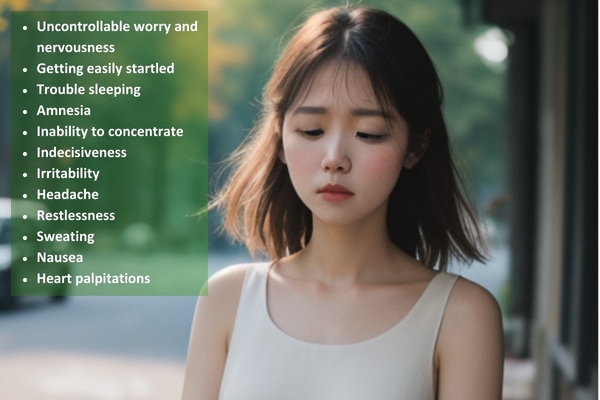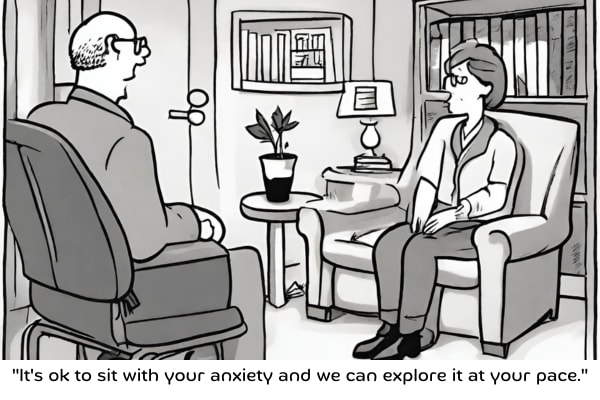If you are reading this blog, then chances are you or your dear one has experienced anxiety at least once. Anxiety is normal. It’s a feeling of unease or worry, often accompanied by physical symptoms like a faster heart rate or sweating. Most people encounter anxiety at some point in their lives.
Can you remember when you were just about to sit for your exams? Maybe your heart was palpitating; you could perhaps hear the heartbeats very clearly, hands sweaty and shaking. These were usually my symptoms of anxiety. I wonder what was yours.
And surprisingly, we repeat our pattern. Today, for example, if I have a crucial meeting or an important upcoming event, I display similar physical symptoms as my signs of worry. List down your symptoms and notice if you have a pattern or if it is different every time.
Whether it’s the nervousness before a job interview or the uneasiness of speaking in public, anxiety is a natural response to stressful situations. Anxiety oscillates in our lives from high to low, depending on our thoughts and situations.
There are times when anxiety becomes chronic and overwhelming. For example, losing a job and having added financial worries can heighten anxiety and lead to a significant impact on our overall mental and physical well-being.
In this article, we will explore understanding the various effects of anxiety on our physical and mental health, as well as the different types of anxiety disorders and their symptoms.
The Physical Effects of Anxiety
Anxiety not only affects our mental well-being but also takes a toll on our physical health. Chronic anxiety can lead to significant stress on the body, like the
- Nervous system
- Cardiovascular system,
- Digestive system
- Respiratory systems.
When we experience anxiety or fear, our body goes into “fight, flight or freeze” mode and signals the brain to release stress hormones and chemicals like adrenaline and cortisol. The brain continues to scan for anxiety, and if it detects similar thought patterns, it will continue to release stress hormones.
While this response is helpful in short-term stressful situations, prolonged exposure to stress hormones can harm our physical health.
One of the most immediate effects of anxiety is an increased heart rate and rapid breathing. This physiological response diverts blood flow to the brain, preparing us to face a potential threat.
Long-term anxiety and panic attacks can lead to the release of stress hormones regularly, contributing to symptoms such as headaches, dizziness, and depression. Moreover, anxiety can increase the risk of high blood pressure and heart disease.
People with anxiety often experience excessive worry, restlessness, irritability, difficulty concentrating, and trouble sleeping. These symptoms can affect their ability to function well and may even lead to avoidance of certain situations or places that trigger anxiety.
Aside from cardiovascular health, anxiety can affect our digestive and excretory systems. Many people with anxiety disorders experience stomachaches, nausea, diarrhoea, and other digestive issues. Loss of appetite can also occur, leading to weight loss or malnutrition. In some cases, anxiety disorders can be associated with irritable bowel syndrome (IBS), which can cause vomiting, diarrhoea, or constipation.
The Impact on Mental Health
Many a time, we may notice anxiety comes out of nowhere. That’s not very uncommon. Anxiety can sometimes be driven by underlying thoughts, worries, or fears that may not be evident on the surface. It might be beneficial to keep a journal or note your thoughts when you feel anxious. This way, you can try to identify any patterns or recurring themes that could give you some insight into your triggers.
Anxiety can often be accompanied by symptoms such as muscle tension, depression, and social isolation. People with anxiety may feel constantly on edge, with an excessive and irrational fear of various situations or objects. They may experience persistent intrusive thoughts, leading to compulsive behaviours or rituals to alleviate anxiety.
Living with chronic anxiety can have a significant impact on our overall quality of life.
Understanding Anxiety Disorders
“Anxiety disorders interfere with daily activities and can impair a person’s family, social and school or working life.” – World Health Organisation. According to WHO- anxiety disorders are the most prevalent mental health conditions worldwide, affecting approximately 301 million people in 2019 alone.
The symptoms of these disorders include excessive and persistent worry, fear, and apprehension. Everyone experiences anxiety to some extent, but those with anxiety disorders experience heightened levels of distress and impairment.
Anxiety disorders can be classified into several types, each with its own symptoms and triggers.
– Generalized anxiety disorder (GAD) occurs when a person worries excessively and uncontrollably about various aspects of their lives without any apparent reason.
– Social anxiety disorder is characterized by an intense fear of social situations and a fear of being judged or humiliated.
– Post-traumatic stress disorder (PTSD) develops after experiencing or witnessing a traumatic event, leading to flashbacks, nightmares, and severe anxiety.
– Obsessive-compulsive disorder (OCD) is characterized by intrusive thoughts and repetitive behaviors.
– Phobias, panic disorder, and separation anxiety disorder are also common anxiety disorders.
Anxiety disorders can lead to difficulties in social and occupational functioning, as individuals may avoid certain situations or interactions due to fear and worry. This avoidance behaviour can further perpetuate anxiety and limit opportunities for personal growth and development.
Anxiety disorders can also contribute to the development of other mental health conditions, such as depression and substance use disorders. The constant state of heightened stress and fear can take a toll on our emotional well-being, leading to feelings of sadness, hopelessness, and a loss of interest in activities we once enjoyed. Moreover, individuals with anxiety disorders may be at a higher risk of suicidal thoughts and behaviours.
I will take up each anxiety disorder in details in the upcoming months.
Treatment Options for Anxiety and Anxiety Disorders
Though there are effective treatment options, according to WHO, only 25% of anxiety-prone people avail of them due to lack of awareness, resources, social stigma, etc.
Seeking help is primarily essential for managing and overcoming these conditions. Psychological interventions, such as
Eye Movement Desensitisation and Reprocessing (EMDR) helps people struggling with anxiety and fear by understanding and working with the core triggers of the anxiety expressions. EMDR therapy focuses on holistically healing the root of the issue at emotional, thinking, and physical levels.
A variety of somatic symptoms often associated with anxiety disorders, such as stomach cramps, headaches, sweaty hands, heart palpitations, and shaky hands, can be alleviated with EMDR (Ogden, Minton & Pain, 2006).
Cognitive-behavioural therapy (CBT), has shown significant efficacy in treating anxiety disorders. CBT helps individuals identify and challenge negative thought patterns and develop healthier coping strategies.
Exposure therapy, a specific form of CBT, gradually exposes individuals to their feared situations or objects, helping them build resilience and reduce anxiety.
Medication also may help to alleviate anxiety symptoms. It’s best understood by working closely with your healthcare provider, as the medication and dosage may vary.
Self-care practices can also play a crucial role in managing anxiety.
– Regular exercise, such as walking or yoga, can help reduce anxiety symptoms by promoting relaxation and releasing endorphins, the body’s natural mood boosters.
– Engaging in stress management techniques, such as deep breathing exercises and mindfulness meditation, can help individuals cultivate a sense of calm and inner peace.
– Additionally, maintaining a balanced diet, getting enough sleep, and avoiding substances like alcohol and caffeine can contribute to overall well-being and reduce anxiety symptoms.
Conclusion
Anxiety and anxiety disorders can have a profound impact on our physical and mental health, affecting various systems in our bodies and interfering with daily life. It is crucial to recognize the signs and symptoms of anxiety and seek appropriate treatment and support. With effective interventions, including therapy, medication, and self-care practices, individuals with anxiety disorders can manage their symptoms and improve their overall well-being. By promoting understanding, empathy, and early intervention, we can create a society that supports and uplifts those who struggle with anxiety. Remember, you are not alone, and help is available to guide you on your journey towards better mental health.
Reference:











